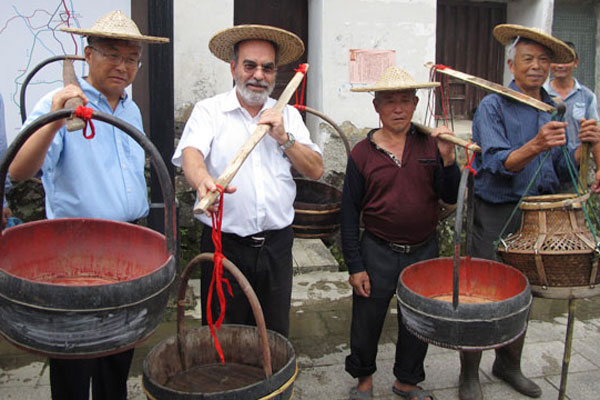1,000-year-old agricultural practice, China's solution to sustainable farming
Updated: 2016-06-07 16:21
By Wu Yan in Qingtian county, Zhejiang province(chinadaily.com.cn)
|
|||||||||
More than a thousand years old practice of raising fish in rice paddies by Chinese farmers not only preserves environment, but also benefits local community, said Jose Graziano da Silva, Director-General of the Food and Agriculture Organization (FAO) of the United Nations, in Qingtian county, in East China's Zhejiang province, on Sunday.
Marking his first visit to an Asian site listed as Globally Important Agricultural Heritage Systems in the mountainous area of East China's Zhejiang province, Da Silva praised China's work in protecting agricultural heritage and developing sustainable production.
The site has preserved more than 1,000 years old farming practice in which farmers raise fish in rice paddies. The unique symbiotic rice-fish aquaculture system sees rice plants providing fish shelter from the sun and predators such as egrets, while fish fertilize the rice and eat the larvae and weeds that harm rice.
In what Da Silva called a "win-win combination", more rice and fish are produced in less land than if they were farmed separately, while less fertilizers and pesticides are used and less cost and labor are invested in the farming.
The green and healthy rice and fish attract tourists from neighboring cities; this provides farmers a chance to earn extra money by running restaurants for visitors when they are not busy on the farm.
Praising the practice, Da Silva said: "Not only environment is preserved and used in a sustainable way, but also it generates benefits for the local community."
He said the system is "a good example of how we can use our natural resources without depleting and destroying them".
The symbiotic rice-fish aquaculture system was listed by the FAO among the first five Globally Important Agricultural Heritage Systems in 2005. So far, China tops the world by having 11 out of 36 agricultural heritage systems.
The FAO-initiated program aims to better acknowledge years of knowledge and management experience of nature and environment sustainability proven by generations of farmers worldwide, and use the information to address challenges that modern agriculture faces today, especially to revive sustainable agriculture.
"To inherit and carry forward farming culture is very important today when traditional agriculture has been transformed into a modern one," said Niu Dun, China's permanent representative to the United Nations Food and Agriculture Organization and former vice-minister at the Ministry of Agriculture.
In a communique issued at the 2016 G20 Agricultural Ministers Meeting, which concluded recently in Xi'an, further developing Globally Important Agricultural Heritage Systems were recognized as a suitable way for preserving good farm practices and promoting sustainable agriculture.
Related Stories
China values historical heritage protection for balanced, sustained growth 2016-04-13 02:17
Xi stresses balance between heritage conservation, development 2016-04-12 22:40
Industrial development threatens half of natural World Heritage sites 2016-04-06 14:06
China raises allowance for intangible heritage practioners 2016-03-30 20:13
22 World Heritage sites in China along the Silk Road 2015-07-15 10:11
Today's Top News
Fifty killed in Florida shooting, worst in US history
Euro 2016 violence spreads to second French city
Former Italian Berlusconi to undergo surgery
The can-do generation to the fore
Riding the wave
China lists first sovereign offshore RMB bond on LSE
British PM denounces Brexit's 'complete untruths'
47% of European businesses would expand in China
Hot Topics
Lunar probe , China growth forecasts, Emission rules get tougher, China seen through 'colored lens', International board,
Editor's Picks

|

|

|

|

|

|








